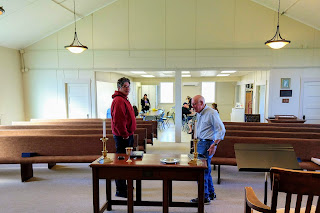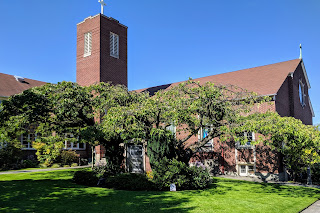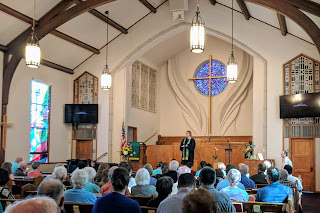You could say, “Go West, Young Man” applied to us. Except you'd have to change it to “woman and man.” And the “young” part doesn’t really apply.
Otherwise, Horace Greeley could have been talking right to us this past weekend. As we near the end of our “visit a new church every week” project, we thought it would be fun to mirror the beginning of this adventure. Back in 2015, we visited the furthest north, south, east, and west churches we could find in California. Now we’re visiting the furthest north, south, east, and west churches we can find in Washington state.
So this week, we went as far west as we could (easily) go in Washington state, which was also pretty much the furthest west we could drive in the contiguous United States. And we went to the furthest west church we could find.
On Saturday we drove to Klahowya Campground in the Olympic National Forest to spend the night by the Sol Duc River. It was the last weekend the campground was open for the year, and it was very quiet. We got up early the next morning to drive the hour or so to Neah Bay, which is part of the Makah Reservation. We had an hour before church started, so we drove to the parking lot at the base of the Cape Flattery trail, which took us as far west as we could go. Then we drove back to Neah Bay.
Mindy’s research had found two possible churches: an Assembly of God Church and a Presbyterian Church, both in Neah Bay. We were leaning Presbyterian because we were pretty sure of when the worship service was. When we saw the two churches, which are a block apart, we did some eyeball calculations. It looked like the Presbyterian Church seemed to be a few feet more to the west.
We arrived at 10:30 am and looked at the sign on the side of the church that read Sunday School at 9:30. Some children filed out of the church and got into cars to go home. (We heard later that 12 - 15 kids have been attending Sunday School class, some from families that don’t attend the church.) The sign said the worship service started at 10:45, but when we got inside, Pastor George greeted us and said the service actually started more 11-ish.
Pastor George, sitting at a long table with his laptop, offered coffee and the restroom (after camping with minimal fire and water, Mindy appreciated the hot coffee and I appreciated the flushing). We sat at the table with Pastor George, and as other people came in the room, introduced us all as they sat at the table for a chat.
Some of the women who joined us told us about the history of the church, which for decades was, apart from the Indian Shaker church (unrelated to the Shakers we’d heard of before), the only church in town. They told us that the mural at the front of the sanctuary was financed by women in the church selling cookbooks. We heard about the church’s choir in the 1950’s and ‘60’s (we were urged to visit the local museum, where reel to reel tapes of those choir performances were housed).
So this week, we went as far west as we could (easily) go in Washington state, which was also pretty much the furthest west we could drive in the contiguous United States. And we went to the furthest west church we could find.
On Saturday we drove to Klahowya Campground in the Olympic National Forest to spend the night by the Sol Duc River. It was the last weekend the campground was open for the year, and it was very quiet. We got up early the next morning to drive the hour or so to Neah Bay, which is part of the Makah Reservation. We had an hour before church started, so we drove to the parking lot at the base of the Cape Flattery trail, which took us as far west as we could go. Then we drove back to Neah Bay.
Mindy’s research had found two possible churches: an Assembly of God Church and a Presbyterian Church, both in Neah Bay. We were leaning Presbyterian because we were pretty sure of when the worship service was. When we saw the two churches, which are a block apart, we did some eyeball calculations. It looked like the Presbyterian Church seemed to be a few feet more to the west.
We arrived at 10:30 am and looked at the sign on the side of the church that read Sunday School at 9:30. Some children filed out of the church and got into cars to go home. (We heard later that 12 - 15 kids have been attending Sunday School class, some from families that don’t attend the church.) The sign said the worship service started at 10:45, but when we got inside, Pastor George greeted us and said the service actually started more 11-ish.
Pastor George, sitting at a long table with his laptop, offered coffee and the restroom (after camping with minimal fire and water, Mindy appreciated the hot coffee and I appreciated the flushing). We sat at the table with Pastor George, and as other people came in the room, introduced us all as they sat at the table for a chat.
Some of the women who joined us told us about the history of the church, which for decades was, apart from the Indian Shaker church (unrelated to the Shakers we’d heard of before), the only church in town. They told us that the mural at the front of the sanctuary was financed by women in the church selling cookbooks. We heard about the church’s choir in the 1950’s and ‘60’s (we were urged to visit the local museum, where reel to reel tapes of those choir performances were housed).
One of the grandmothers quoted her granddaughter saying that they need to “pay attention to Pastor George and God” during the worship service. There was speculation that some might not make it to church that morning since the Seahawks were playing the Raiders in London, and the game had already started.
Pastor George mentioned he was disappointed that he hadn’t received more information from the denomination on disaster relief for the recent Florida hurricane. Since that hadn’t come in, he wondered if Mindy and I would be willing to share for their Minute for Missions. (Of course we agreed). By then, it was 11ish, so Pastor George asked the group if we should just go on chatting around the table or should we go to worship? Unanimous agreement on worship.
We sang many of our favorite hymns that morning, with music provided by the playlist on Pastor George’s tablet (“Take My Life,” “A Mighty Fortress is our God,” “Immortal, Invisible” among them). During the Passing of the Peace, there was time for everyone to shake the hand of every other person, and they did. During the Minute for Missions, Mindy and I told how we’ve seen God work in powerful ways through His Church, particularly Vieux Carre Baptist Church in the French Quarter of New Orleans.
Pastor George prayed for us, which we greatly appreciated. People shared other needs for the prayer time, which concluded with the Lord’s Prayer. (There was a moment of “Debt” / ”Trespass” confusion. We’ve experienced it other churches, too. Pastor George blamed his Methodist upbringing.) Pastor George prayed for hurricane victims in Florida, the local schools (including the high school football team), the tribal council and state government, and the upcoming elections.
The congregation is following the lectionary in their worship services, with Scripture readings from the Old Testament, New Testament, Psalms, and Gospels. The Gospel reading (for which we stood) was the story of the rich, young ruler from Mark. Pastor George commented, “That one caught my eye and kicked me in the backside.” He went on to say, “We’ve all had opportunities to give to the poor; sometimes we take them, and sometimes we don’t.”
After church, we had more time to chat around the table, this time with snacks along with the coffee. We couldn’t stay long, though; we had a long drive back to Seattle. Several people wished us well and even mentioned they’d be praying for us.
The Old Testament Scripture from the lectionary that morning was from chapter 23 of the book of Job. Verses 8 & 9 caught my attention, “But if I go to the east, he is not there; if I go to the west, I do not find him. When he is at work in the north, I do not see him; when he turns to the south, I catch no glimpse of him.”
I hate to disagree with Job, but we saw God at work in His Church in the east of Washington, and this week we saw it in the west. We trust we’ll see the same in the north and south over the next couple of weeks.
Pastor George mentioned he was disappointed that he hadn’t received more information from the denomination on disaster relief for the recent Florida hurricane. Since that hadn’t come in, he wondered if Mindy and I would be willing to share for their Minute for Missions. (Of course we agreed). By then, it was 11ish, so Pastor George asked the group if we should just go on chatting around the table or should we go to worship? Unanimous agreement on worship.
We sang many of our favorite hymns that morning, with music provided by the playlist on Pastor George’s tablet (“Take My Life,” “A Mighty Fortress is our God,” “Immortal, Invisible” among them). During the Passing of the Peace, there was time for everyone to shake the hand of every other person, and they did. During the Minute for Missions, Mindy and I told how we’ve seen God work in powerful ways through His Church, particularly Vieux Carre Baptist Church in the French Quarter of New Orleans.
Pastor George prayed for us, which we greatly appreciated. People shared other needs for the prayer time, which concluded with the Lord’s Prayer. (There was a moment of “Debt” / ”Trespass” confusion. We’ve experienced it other churches, too. Pastor George blamed his Methodist upbringing.) Pastor George prayed for hurricane victims in Florida, the local schools (including the high school football team), the tribal council and state government, and the upcoming elections.
The congregation is following the lectionary in their worship services, with Scripture readings from the Old Testament, New Testament, Psalms, and Gospels. The Gospel reading (for which we stood) was the story of the rich, young ruler from Mark. Pastor George commented, “That one caught my eye and kicked me in the backside.” He went on to say, “We’ve all had opportunities to give to the poor; sometimes we take them, and sometimes we don’t.”
After church, we had more time to chat around the table, this time with snacks along with the coffee. We couldn’t stay long, though; we had a long drive back to Seattle. Several people wished us well and even mentioned they’d be praying for us.
The Old Testament Scripture from the lectionary that morning was from chapter 23 of the book of Job. Verses 8 & 9 caught my attention, “But if I go to the east, he is not there; if I go to the west, I do not find him. When he is at work in the north, I do not see him; when he turns to the south, I catch no glimpse of him.”
I hate to disagree with Job, but we saw God at work in His Church in the east of Washington, and this week we saw it in the west. We trust we’ll see the same in the north and south over the next couple of weeks.






















































